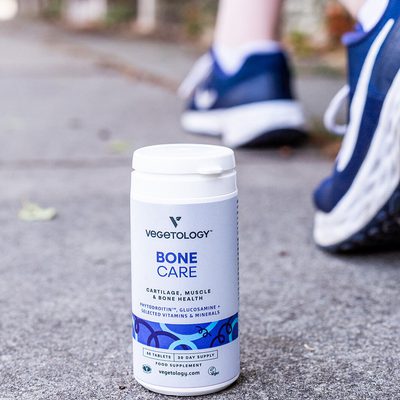
You probably don’t give your joints much thought in your teens — but by your mid-to-late twenties, things start to change. Whether you’re a regular at the gym, a runner, or just love being active, you may begin to notice little signs: that familiar stiffness getting out of bed, a few pops or clicks when climbing stairs, or a bit of soreness after a tough workout. Sound familiar?
The truth is, your joints work hard every single day — and the earlier you start looking after them, the better. While regular exercise is important, what you eat plays a huge role in maintaining joint health, bone strength, and long-term mobility. Let’s explore the key nutrients that help support strong, flexible joints — and how you can include them in your daily routine.
Why nutrition matters for joint health
Your joints rely on more than just movement — they depend on essential vitamins, minerals, and fatty acids to stay lubricated, flexible, and supported by strong muscles and bones. Nutrients like Omega-3, glucosamine, chondroitin, Vitamin K2, and calcium all play vital roles in keeping your joints healthy from within.
Calcium: the foundation of bone strength
We all grew up hearing that “milk makes your bones strong,” and that’s because calcium is essential for building and maintaining bone density. However, calcium alone isn’t absorbed efficiently — it works best when paired with Vitamin D3, which helps your body transport and use calcium effectively.
Our Calcium & D3 supplement offers a simple, effective way to maintain healthy calcium levels and support strong bones, particularly if you don’t get enough from your diet. For even greater bone support, combining calcium and D3 with Vitamin K2 helps ensure calcium goes exactly where it’s needed — into your bones, not your arteries.
Looking for added K2 support? Our Bone Care formula combines Calcium, Vitamin D3, and K2 for comprehensive bone health and mobility.


Vitamin K2: the unsung hero of bone and heart health
Vitamin K2 is a relatively new nutrient on the supplement scene in the West, but it’s been well-known in Japan for decades — where it’s found in a fermented soybean dish called natto. Research suggests that Japan’s low rates of heart disease and bone problems are linked to higher dietary K2 levels.
Vitamin K2 helps activate proteins that guide calcium to the bones and teeth while keeping it out of your arteries. When paired with Vitamin D3, it creates an optimal combination that maximises calcium absorption and supports both bone density and cardiovascular health.
Glucosamine & Chondroitin (and the plant-based alternative: Phytodroitin™)
In nature, glucosamine and chondroitin are typically found in shellfish — with chondroitin often sourced from shark fins. Understandably, that raises ethical concerns for many people.
At Vegetology, we developed an innovative plant-based alternative called Phytodroitin™, created from plant matter and algae to replicate the natural mucopolysaccharide structure found in chondroitin. These mucopolysaccharides help give your joints that “bounce,” supporting the synovial fluid that keeps them cushioned and flexible.
So if you’re looking for a vegan-friendly joint supplement, Phytodroitin™ delivers all the benefits of traditional chondroitin — without harming marine life.


Omega‑3: the anti-inflammatory powerhouse
While Omega-3 is often celebrated for its heart health benefits, it’s equally valuable for joint support. These essential fatty acids help increase synovial fluid production, keeping your joints lubricated and reducing friction during movement.
Studies also show that Omega-3 fatty acids can help reduce joint inflammation, ease stiffness, and even lower the risk of osteoporosis by supporting bone density.
How to support your bones and joints every day
If you’re wondering whether you’re getting enough of these key nutrients, start by assessing your diet. A healthy, balanced diet — whether vegan, vegetarian, or omnivorous — will usually provide calcium, magnesium, and several essential vitamins.
However, nutrients like glucosamine, chondroitin (or Phytodroitin™), and Vitamin K2 are often missing. That’s why targeted joint and bone health supplements can make such a difference, especially if you live an active lifestyle or are starting to notice those occasional pops and creaks.
Your joints are built to move — but they need the right nutrients to stay that way. From Omega-3s that keep them lubricated to Phytodroitin™ and Vitamin K2 that support structure and strength, joint care truly starts from within.
FREE eBook — The ultimate guide to dietary supplements
Confused about which supplements you really need — and which ones you don’t? You’re not alone. With so many options on the market, understanding what your body truly benefits from can feel overwhelming. That’s why we created The Ultimate Guide to Dietary Supplements — your go-to resource for cutting through the noise. Whether you’re vegan, vegetarian, or simply focused on improving your health, this guide will help you make informed choices for a stronger, more balanced you.